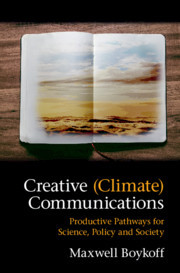Description
Creative (Climate) Communications
Productive Pathways for Science, Policy and Society
Author: Boykoff Maxwell
Through this assessment of creative (climate) communications, readers will understand what works where, when, why and under what conditions.
Language: English
Subject for Creative (Climate) Communications:
Prix indicatif 86,50 €
Disponible chez l'éditeur (délai d'approvisionnement : 14 jours).
Add to cart
Creative (Climate) Communications
Publication date: 07-2019
318 p. · 15.6x23.5 cm · Relié
Publication date: 07-2019
318 p. · 15.6x23.5 cm · Relié
32,87 €
Disponible chez l'éditeur (délai d'approvisionnement : 14 jours).
Add to cart
Creative (Climate) Communications
Publication date: 07-2019
318 p. · 15.3x22.8 cm · Broché
Publication date: 07-2019
318 p. · 15.3x22.8 cm · Broché
Résumé
/li>Sommaire
/li>Biographie
/li>
Conversations about climate change at the science-policy interface and in our lives have been stuck for some time. This handbook integrates lessons from the social sciences and humanities to more effectively make connections through issues, people, and things that everyday citizens care about. Readers will come away with an enhanced understanding that there is no 'silver bullet' to communications about climate change; instead, a 'silver buckshot' approach is needed, where strategies effectively reach different audiences in different contexts. This tactic can then significantly improve efforts that seek meaningful, substantive, and sustained responses to contemporary climate challenges. It can also help to effectively recapture a common or middle ground on climate change in the public arena. Readers will come away with ideas on how to harness creativity to better understand what kinds of communications work where, when, why, and under what conditions in the twenty-first century.
Preface; 1. Here and now; 2. How we know what we know; 3. Do the right thing; 4. Ways of learning, ways of knowing; 5. It's not you, it's me … well it's actually us; 6. Academic climate advocacy and activism; 7. Silver buckshot; 8. Search for meaning; Appendices; References; Index.
Maxwell Boykoff is Director of the Center for Science and Technology Policy, which is part of the Cooperative Institute for Research in Environmental Sciences at the University of Colorado Boulder. He is also an associate professor in the Environmental Studies program at the University of Colorado. Boykoff has ongoing interests in cultural politics and environmental governance, science and environmental communications, science-policy interactions, political economy and the environment, and climate adaptation. He has authored many peer-reviewed journal articles, book chapters, and books in these subjects, including Who Speaks for the Climate?: Making Sense of Media Reporting on Climate Change (Cambridge, 2011).
© 2024 LAVOISIER S.A.S.

